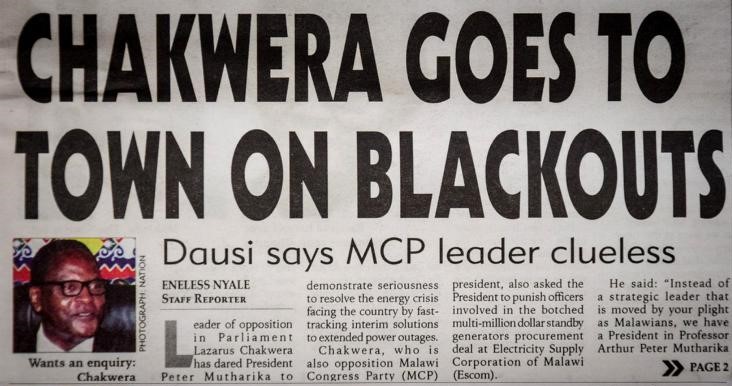
Leader of opposition in Parliament Lazarus Chakwera has dared President Peter Mutharika to demonstrate seriousness to resolve the energy crisis facing the country by fast-tracking interim solutions to extended power outages.
Chakwera, who is also opposition Malawi Congress Party (MCP) president, also asked the President to punish officers involved in the botched multi-million dollar standby generators procurement deal at Electricity Supply Corporation of Malawi (Escom).
He said: “Instead of a strategic leader that is moved by your plight as Malawians, we have a President in Professor Arthur Peter Mutharika who seems clueless, directionless and insensitive to the people’s misery and suffering inflicted through these blackouts.
“I personally can see that the country in which we are living has literary been plunged into darkness by the incessant blackouts as a result of Escom’s load-shedding and, figuratively, into darkness of hopelessness, as there seems to be no end to the blackouts and other economic problems plaguing this nation.”
Chakwera was referring to the botched deal to source generators to add 78 megawatts (MW) to the national grid to ease power supply woes effective October this year.
Escom messed up the generators deal some few months ago when it went against own recommendation to award the supply of generators to a company called Aggreko. The deal was cancelled and Electricity Generation Company (Egenco) had to start all over again.
The President last week “gate-crashed” into an Escom and Egenco meeting and later hinted that power outages may only improve in a year’s time.
Power generation woes this week moved from bad to worse with a loss of 20MW within a week, a situation that has prompted a drastic load shedding programme that has seen some areas having over 24 hours of no power.
Egenco, which sells its power to Escom for supply to consumers, this week described the downward spiral of power generation from 180MW to 160MW as “so alarming”.
Egenco chief executive officer (CEO) William Liabunya said water levels in Shire River, the sole outlet of Lake Malawi and home to over 90 percent of Escom’s hydro-electric power plants that produce 350MW, keep dropping, resulting in reduced power production.
Chakwera called for a public enquiry into the foiled generators deal, saying the generators could have eased the energy crisis.
He said as a result of the blackouts, hospitals have turned into death zones, as operating theatres cannot carry out surgery and vaccines cannot be stored in deep freezers.
However, this assertion is in sharp contrast to a statement by Escom CEO Evelyn Mwapasa last week that despite extensively rationing domestic and industrial consumers, Escom prioritises strategic institutions, including central hospitals and water boards nationwide where power is not switched off.
Many businesses have virtually ground to a halt, with operators of butcheries, salons, maize mills, welding utilities and hatcheries losing businesses, said Chakwera.
When we later asked MCP deputy secretary general Eisenhower Mkaka on policy alternatives the party has to end the current power blackouts, he said those could be shared at another forum. He said yesterday, the party wanted to highlight the need for more urgent action towards resolving the crisis and pointing out how the nation was failed through the bad generator deal.
But Minister of Information and Communications Technology Nicholas Dausi dismissed Chakwera’s sentiments, saying they were rude, demeaning and insulting and not fit to be made by a leader.
He said while the MCP president seems to be clueless himself on how the energy crisis can be solved, government is busy working to rectify the problem.
He said: “Honourable Chakwera is well known to be a man who is insulting, demeaning, crude, rough cow, cut throat and plays antagonistic politics.”
Currently, government is doing feasibility studies at Fufu on South Rukuru River with the potential capacity of 120MW, Mpatamanga Gorge with the capacity of 300MW, Kholombidzo Falls with the capacity of 150 MW, Chimugonda with the capacity of 60MW and Kam’mwamba coal-fired power plant with the potential capacity of 300MW.
